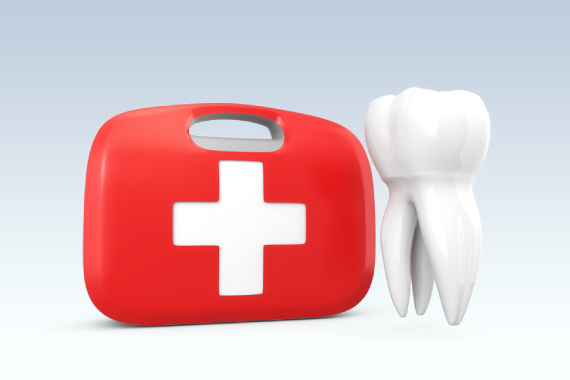Wondering, “What are Common Causes of Dental Emergencies?” Dental emergencies can occur suddenly and often leave individuals in distress. Understanding the common causes behind these emergencies is vital for maintaining good oral health and knowing how to respond in urgent situations.
This guide will look into the various factors that can lead to dental emergencies, empowering you to identify the risks and take measures to safeguard your dental well-being.

Common Causes of Dental Emergencies
The common cause of dental emergencies is:
Tooth Trauma
Dental emergencies often result from accidents or trauma to the mouth. Falls, sports injuries, or automobile accidents can cause fractures, chips, or complete dislodgement of teeth. Timely dental care is crucial to assess the damage and prevent further complications.
Severe Toothache
Intense and persistent tooth pain is a common indicator of dental issues such as decay, infection, or abscess. Ignoring severe toothaches can lead to worsening pain, spread of infection, and potential tooth loss. Immediate treatment is essential to alleviate discomfort and address the underlying cause.
Broken or Lost Fillings/Crowns
Fillings or crowns that become damaged, loose, or dislodged can expose sensitive tooth structures to bacteria and debris, leading to discomfort and an increased risk of decay. Emergency dental care is necessary to repair or replace the filling or crown and protect the affected tooth from further damage.
Abscess or Infection
Dental abscesses, characterized by swelling, pus formation, and severe pain, indicate a bacterial infection in the gums or teeth. Without prompt treatment, abscesses can lead to systemic infections, bone loss, and even life-threatening complications. Immediate intervention is essential to drain the abscess, eliminate infection, and prevent further spread.
Loose or Knocked-Out Tooth
Teeth that are loose or completely knocked out due to trauma require immediate attention to increase the chances of successful reattachment or preservation. Quick action can help preserve the tooth’s integrity, prevent permanent tooth loss, and restore oral function.
Objects Caught Between Teeth
Food particles, foreign objects, or dental appliances lodged between teeth can cause discomfort, pain, and irritation of the surrounding tissues. Attempting to remove objects with sharp or abrasive tools can cause further damage. Emergency dental care is necessary to safely remove the object and address any resulting damage or discomfort.
Orthodontic Emergencies
Problems with orthodontic appliances such as braces or wires can cause irritation, cuts, or injuries to the soft tissues of the mouth. Loose brackets, broken wires, or displaced appliances require immediate attention from a dentist or orthodontist to prevent discomfort, injury, or delays in orthodontic treatment.
Sudden Jaw Pain
Unexplained or severe jaw pain can indicate temporomandibular joint (TMJ) disorders characterized by dysfunction or inflammation of the jaw joint. TMJ disorders can cause pain, stiffness, clicking or popping sounds, and difficulty chewing or speaking. Timely evaluation and treatment by a dental professional are necessary to alleviate pain and restore jaw function.
These examples highlight the urgency of addressing dental emergencies promptly to prevent further complications, alleviate pain, and preserve oral health. Seeking immediate dental care ensures timely intervention and appropriate treatment tailored to the specific dental emergency.
Essential Tips to Prevent Dental Emergencies
Following are the essential tips to prevent Dental emergencies:
Protect Your Smile with a Mouthguard
Are you an active sports enthusiast? Safeguard your smile by wearing a mouthguard during athletic activities. Whether you’re on the court or field, a mouthguard shields your teeth from potential injuries caused by rough play or unexpected impacts. Prioritize your dental safety before stepping onto the field.
Be Mindful of Your Eating Habits
While our teeth are resilient, they’re not invincible. Avoid unexpected tooth damage by being mindful of what and how you eat. Hard candies and tough meats can easily chip or crack teeth. Before indulging, consider the potential risks to your dental health. Skip the hard candies and choose healthier snack alternatives to protect your smile.
Break Oral Fixations
Oral fixations like nail biting or chewing on non-food items can threaten your dental health. These habits may unknowingly lead to cracked or chipped teeth. Break the cycle by finding alternative ways to keep your hands occupied and curb oral fixations. Chew sugarless gum to redirect the urge while also promoting saliva production and oral hygiene.
By following these measures, you can minimize the risk of having dental emergencies and maintain a healthy, radiant smile for years to come.
Conclusion
Understanding the various causes of dental emergencies is essential for maintaining optimal oral health. “What are Common Causes of Dental Emergencies?” sheds light on the potential risks and scenarios that may lead to dental emergencies, empowering individuals to take proactive measures to safeguard their dental well-being. By recognizing the signs and symptoms of dental emergencies and seeking prompt, professional care, individuals can mitigate risks, alleviate discomfort, and preserve their oral health.
For those in Stone Ridge, VA, seeking comprehensive dental care, Prime Family Dentistry is here to serve you. Book an appointment today and experience dental care tailored to your needs. New Patients can call at (703) 214-9126, while All Other Callers can call at (703) 957-3536.

